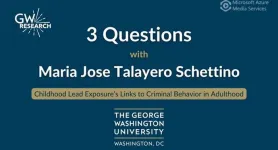(Press-News.org) ATLANTA, August 1, 2023 – A new study from researchers at the American Cancer Society (ACS) found monthly adult cancer diagnoses decreased by half in April 2020 during the COVID-19 pandemic in the United States. The largest decrease was for stage I cancers, resulting in a higher proportion of late-stage diagnoses. The study is the most comprehensive research to date about the effects of the first year of the pandemic on cancer diagnoses and stage in the nation. The paper was published today in the journal Lancet Oncology.
“During the emergence of the pandemic, we know health care was disrupted in the U.S. and steep declines were reported for cancer screening services,” said Dr. Xuesong Han, lead author of the study and scientific director of health services research at the American Cancer Society. “These updated results for all major cancer types nationwide represent a more comprehensive view and continue to be concerning as decreased screening, as well as delayed and forgone routine check-ups or doctor visits, can lead to underdiagnosis of cancer, especially in early stages, where treatment is most effective.”
For this study, using the latest national registry data, researchers identified a total of 2,404,050 adults newly diagnosed with cancer, including 830,528 in 2018, 849,290 in 2019, and 724,232 in 2020. The number of diagnoses for all stages decreased substantially following the COVID-19 emergence in the U.S. in March 2020, though monthly counts returned to near pre-pandemic levels by the end of 2020. The decrease was largest for stage I diagnoses, leading to higher odds of late-stage diagnoses in 2020 vs. 2019. The pattern was seen in most cancer types and sociodemographic groups, though it was most prominent among individuals who have historically experienced barriers in accessing health care, including individuals who are Hispanic, Asian American and Pacific Islander, uninsured, and living in the most socioeconomically deprived areas.
“The estimates we present represent larger declines in the numbers of individuals diagnosed with early-stage cancers than in the numbers of individuals diagnosed with late-stage cancers,” added Han. “These findings likely reflect the time when individuals sought care or screening during the pandemic rather than a stage shift in cancer progression. More ongoing cancer surveillance with longer-term data is warranted to better understand the full impact of the COVID-19 pandemic.”
The American Cancer Society’s advocacy affiliate, the American Cancer Society Cancer Action Network (ACS CAN), continues to work at all levels of government to remove barriers to affordable screening through Medicaid and the National Breast and Cervical Cancer Early Detection Program (NBCCEDP), a federal and state partnership in all 50 states, the District of Columbia, 13 tribal organizations, two U.S. territories, and five U.S.-Affiliated Pacific Islands providing breast and cervical cancer screenings, diagnostic tests, and treatment referral services to communities that are limited-income, underserved, underinsured, and uninsured.
“ACS CAN will continue to advocate for adequate funding for the NBCCEDP as well as work to obtain additional state appropriations which will preserve a critical safety net for those who continue to lack access to lifesaving screening, diagnostic, and treatment services. The program is critically important to helping to get screening rates back on track after a decline due to COVID,” said Lisa Lacasse, president of the ACS CAN. "With nearly four million individuals having lost coverage following the end of pandemic era continuous enrollment, we are also urging states to undertake a careful process to evaluate Medicaid eligibility to ensure coverage isn’t erroneously disrupted for those who have no other affordable coverage option. For many cancer patients, disenrollment from Medicaid means disruptions to treatment that could have life-threatening consequences.”
Other ACS authors participating in this study include: Nova Yang, Dr. Leticia Nogueira, Dr. Nikita Wagle, Jingxuan Zhao, Kewei Sylvia Shi, Dr. Qinjin Fan, Elizabeth Schafer, Dr. Robin Yabroff, and Dr. Ahmedin Jemal.
# # #
About the American Cancer Society
The American Cancer Society is a leading cancer-fighting organization with a vision to end cancer as we know it, for everyone. For more than 100 years, we have been improving the lives of people with cancer and their families as the only organization combating cancer through advocacy, research, and patient support. We are committed to ensuring everyone has an opportunity to prevent, detect, treat, and survive cancer. To learn more, visit cancer.org or call our 24/7 helpline at 1-800-227-2345. Connect with us on Facebook, Twitter, and Instagram.
END
Findings from the first-ever prospective trial including a randomized pathway comparing surgery to non-surgical treatment of malignant bowel obstruction (MBO) provide important evidence to help inform clinical decision-making in managing this frequent complication in patients with advanced cancer.
Results include data on clinical outcomes and patient quality of life and are being reported in The Lancet Gastroenterology & Hepatology.
The S1316 study, a hybrid design trial that included a randomized component, was led by the SWOG Cancer Research Network, a clinical trials group funded by the National Cancer Institute ...
Peer-reviewed / Randomised trial / People
Planned interim safety analysis of the first randomised trial investigating the use of AI in a national breast cancer screening programme underscores the potential of AI to make mammography screening more accurate and efficient.
Interim findings from a cohort of over 80,000 women in Sweden reveal AI-supported screening detected 20% more cancers compared with the routine double reading of mammograms by two breast radiologists.
The use of AI did not increase false positives (when a mammogram ...
Royal Ontario Museum (ROM) announces the oldest swimming jellyfish in the fossil record with the newly named Burgessomedusa phasmiformis. These findings are announced in the journal Proceedings of the Royal Society B.
Jellyfish belong to medusozoans, or animals producing medusae, and include today’s box jellies, hydroids, stalked jellyfish and true jellyfish. Medusozoans are part of one of the oldest groups of animals to have existed, called Cnidaria, a group which also includes ...
This press release is available online at: https://news.agu.org/press-release/earths-most-ancient-impact-craters-are-disappearing/
AGU press contact:
Rebecca Dzombak, news@agu.org (UTC-4 hours)
Contact information for the researchers:
Matthew S. Huber, University of the Western Cape, mhuber@uwc.ac.za (UTC+2 hours)
WASHINGTON — Earth’s oldest craters could give scientists critical information about the structure of the early Earth and the composition of bodies in the solar system as well as help to interpret crater records on other ...
The silver rice rat, an endangered species endemic to the Florida Keys, makes its home as close to the shoreline as possible for easy access to its low-tide marine species diet.
It is this proximity to the water that prompted a team of scientists at the University of Florida to examine the rats’ movement in correlation with historical tidal data over 17 years. The sea level rose 0.142 meters between 2004 and 2021, and the researchers also found that the rats moved to higher ground. In fact, the rats ...
By Adam Russell
A new research study shows pecans may help prevent obesity and reduce inflammation. (Texas A&M AgriLife photo by Laura McKenzie)
“Obesity and diabetes numbers are increasing in modern society worldwide, and the trend in high fat diet consumption is one of the main reasons besides lifestyle and genetic predisposition,” said Luis Cisneros-Zevallos, Ph.D., professor of horticulture and food science in the Department of Horticultural Sciences in the Texas A&M College of Agriculture and ...
WASHINGTON (August 1, 2023)— New analysis from researchers at the George Washington University links lead exposure either in utero or during childhood with an increased risk of engaging in criminal behavior in adulthood. While prior research has found an association between lead exposure and criminal behavior at the aggregated population level, this is the first review to bring together the existing data at the individual-level of exposure and effects.
The first systematic review of available studies that address links between individual lead exposure and crime, or other antisocial behaviors, the research team’s analysis included 17 ...
A study conducted at Vanderbilt University Medical Center and 11 other hospitals and practices across the United States shows that use of low-dose atropine eyedrops, commonly used in a higher dose to treat lazy eye, was no better than a placebo at slowing myopia (nearsightedness) progression and elongation of the eye among children treated for two years.
The first randomized controlled trial of its kind aimed at identifying an effective way to manage myopia was published last week in JAMA Ophthalmology. It was conducted by the Pediatric Eye Disease Investigator Group and funded by the National Eye Institute (NEI).
“We found, interestingly, and honestly ...
BINGHAMTON, N.Y. -- A proposed machine learning framework and expanded use of blockchain technology could help counter the spread of fake news by allowing content creators to focus on areas where the misinformation is likely to do the most public harm, according to new research from Binghamton University, State University of New York.
The research led by Thi Tran, assistant professor of management information systems at Binghamton University’s School of Management, expands on existing studies by offering tools for recognizing patterns in misinformation and helping ...
BOSTON – Massachusetts General Hospital (MGH), a founding member of the Mass General Brigham health system, officially opened the Legorreta Center for Clinical Transplant Tolerance, the first-of-its kind center in the world dedicated to preventing organ rejection after transplant surgery without the use of lifelong immunosuppressive medications. Immunosuppressive medications prevent the immune system from rejecting a transplanted organ, but come with serious side effects, increasing the chance of infections and other illnesses like cancer, diabetes, and heart disease. The mission of the Legorreta Center is to eliminate these risks by eliminating ...







